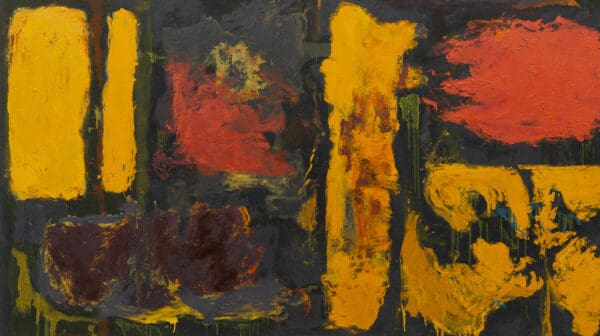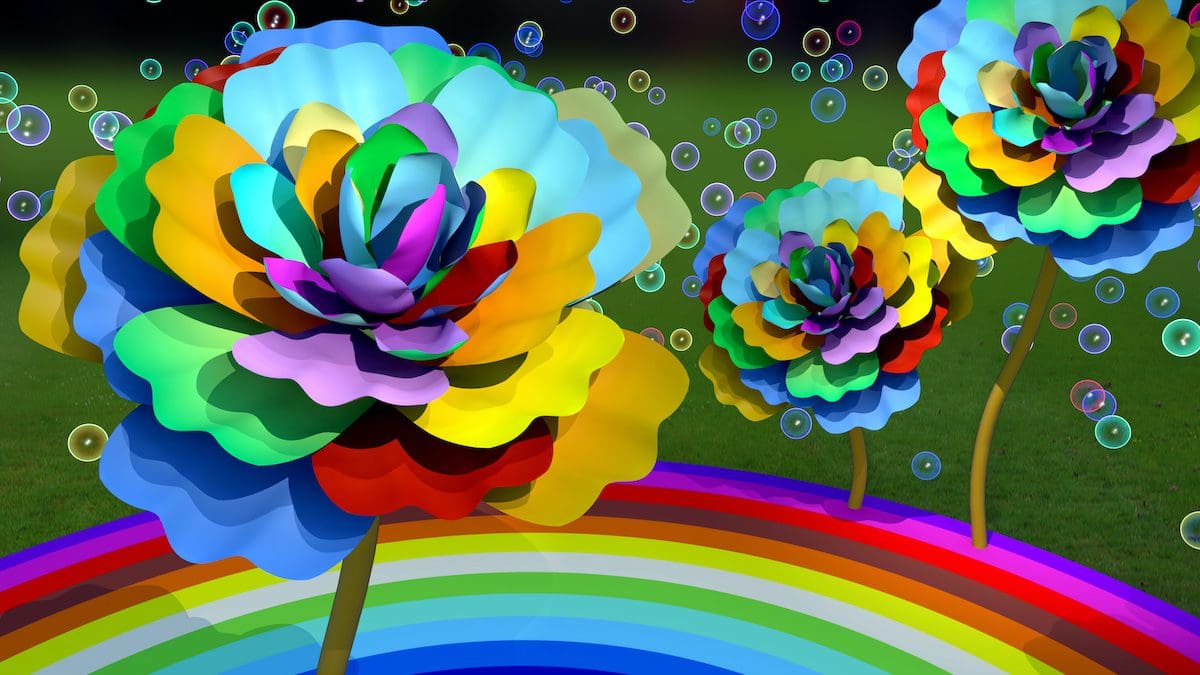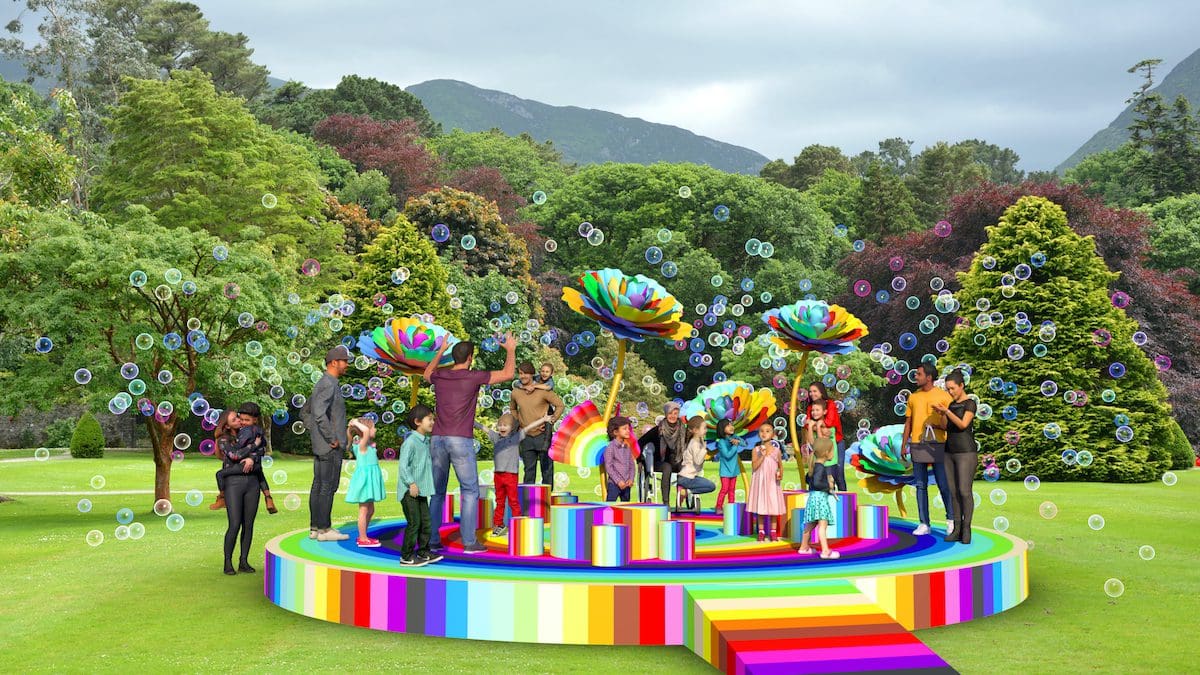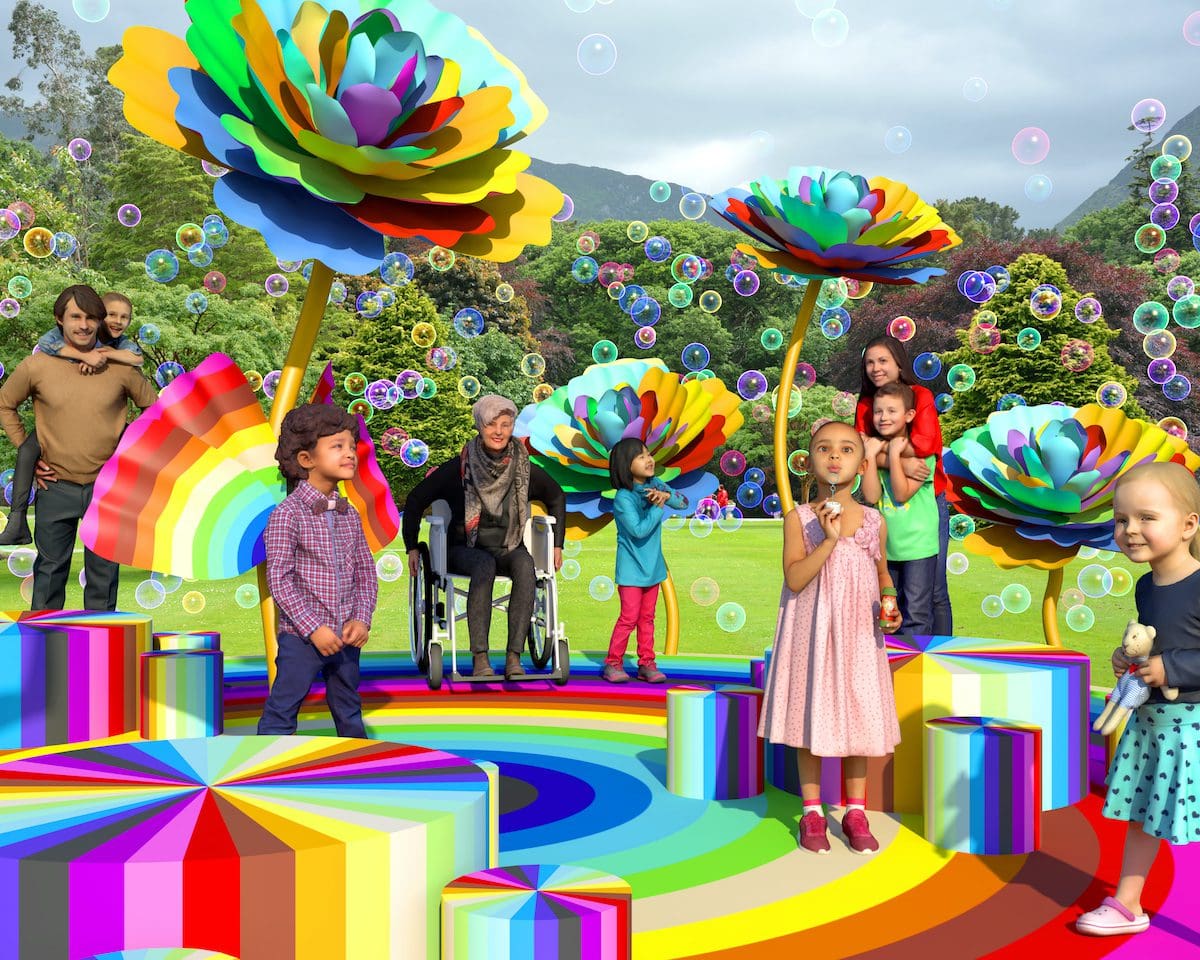
Making Space at the Table
NAP Contemporary’s group show, The Elephant Table, platforms six artists and voices—creating chaos, connection and conversation.


At first it seems like Hiromi Tango’s large garden installation at Brisbane Festival is a playful confection of giant peonies, growing from a platform that lights up as a dance floor at night, all in the artist’s signature rainbow style.
But YU KA or Dream Flower contains multitudes of meanings, beginning with gentleness and compassion. The work reflects Tango’s belief that these sweet-smelling flowers, found in various vibrant colours in the wild, once grew wherever Buddha stepped on the earth.
The peonies are also a paean to the regenerative properties of plants and soil, from which natural remedies for ailments are drawn. It’s a growing interest for the Japanese-born, Tweed Heads-based artist who has suffered recent spells of long Covid and chronic fatigue. After a lifetime of never falling ill, she’s felt the impact on her usually effervescent personality.
Tango’s rainbows, meanwhile, were born from a long interest in the neuroscience of mental health: in a 2021 TEDx talk, she coined the word “brainbow”, a portmanteau of brain and rainbow. “We feel so lucky that we see the rainbows, it makes us so happy,” she says.
Given the recent pandemic and lockdowns, the 2022 Northern Rivers floods and the ongoing war in Ukraine, “We need a source of hope, to dream about how we can transform,” says Tango, quoting former First Lady Michelle Obama, who has said, “Every day you have the power to choose our better history.”
Speaking from her home, where a picturesque window behind Tango displays her family’s tranquil garden, she reflects that her sensory perceptions have sharpened during her 25 years in Australia, thanks to the cultural influences of her two countries—even if Covid has dulled her sense of smell and taste of late.
“I was raised in a very traditional Japan as a very traditional female—not allowed to have a voice and speak—so who am I, as a middle-aged, Japanese Australian?” She ponders, dressed in a smart, second-hand velvet suit, her hair brushed back, each fingernail painted a different colour.
“I have dedicated my life for arts, science, biology, and a passion for gardens. I love cooking and upcycling. I wanted to make artwork that is true to myself.”
Tango grew up in a conservative Buddhist family beneath the misty mountains on the Japanese island of Shikoku, where women did not usually speak in the presence of men: her mother, Reiko, “only really started talking” in her 70s, when her father succumbed to dementia. For much of her life, Tango “communicated with non-verbal language” with them.
Tango met her partner, Australian artist Craig Walsh, when he undertook an artist residency at her university in Tokyo. They sometimes collaborate on art projects, and have two early teenage children, Kimiyo and Mikiyo, who Tango introduces while holding up her mobile phone on a walking tour of their home.
Tango is keenly interested in how epigenetics is showing that trauma and disease can be passed down through generations, having developed depression and anxiety earlier in her life. “Your grandparents’ generation get through the war or starvation,” she says, “but that trauma is carried on through generations, and it’s embedded in your mechanism genes through DNA changes.”
While emphasising she is an artist and not a scientist, her imagination has also been piqued by Australian molecular bioscientists’ work on harnessing nature to tackle diseases: “Lots of cures come from soil and natural medicine from the plants,” she marvels.
Tango believes art making is a mental healer, helping people focus on the present, while scientific discovery is likewise a “great source of hope and optimism”.
In the foyer at the local Tweed Valley Hospital, Tango has been assembling a woven sculptural “healing garden”. These are artworks inspired by the green and blue colours of the local landscape, reflecting the healing properties of flora, created with assistance from hospital patients and school children.
Tango herself professes to having a “childful” mind, which means she has an “open and pure heart”. When I first interviewed Tango last year as she unveiled Rainbow Dream : Moon Rainbow at Hobart’s Dark Mofo festival, she laughed gleefully and said: “My children are actually more mature than I am.”
But she can be stark with her art, too. For Tango’s 2018 photographic series Bleached Genes she covered herself in white house paint to metaphorically “cleanse” her spirituality, genetics and memory, in response to her father being bed-bound with dementia “and him not realising who I am sometimes”.
Long Covid has left the artist herself bed-bound on occasion of late, but it’s a journey she has philosophically embraced. While her appetite for food has not yet recovered, her inspiration continues apace. Her next artwork will explore the meaning of senses weakened and dulled, for an artist whose life has been emblazoned with rainbows.
YU KA / Dream Flower
Hiromi Tango
Brisbane Festival Garden (Brisbane QLD)
1—23 September
